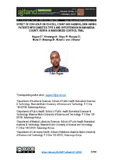| dc.contributor.author | Sagam, C | |
| dc.contributor.author | Kivelenge, A | |
| dc.contributor.author | Olayo, R | |
| dc.contributor.author | Wanjala, C | |
| dc.contributor.author | Mutai, C | |
| dc.contributor.author | Wesonga, B | |
| dc.contributor.author | Mutuli, L | |
| dc.contributor.author | Situma, J | |
| dc.date.accessioned | 2023-04-24T06:55:31Z | |
| dc.date.available | 2023-04-24T06:55:31Z | |
| dc.date.issued | 2023-02-04 | |
| dc.identifier.uri | https://doi.org/10.18697/ajfand.117.22910 | |
| dc.identifier.uri | https://www.ajol.info/index.php/ajfand/article/view/245006 | |
| dc.identifier.uri | http://ir-library.mmust.ac.ke:8080/xmlui/handle/123456789/2181 | |
| dc.description.abstract | Type II diabetes mellitus (DM) and hypertension (HTN) diseases are part of the world’s challenges in achieving sustainable development goals. Cases of type II diabetes mellitus and hypertension diseases in low and middle-income countries are becoming a concern. Type II diabetes mellitus is an inflammatory disease. When there is inflammation the immune system is triggered and haemoglobin level is affected. While there have been numerous strategies to address the issue, these efforts have not been sufficient to guarantee a reduction in disease severity. This was an experimental study conducted in Kakamega County, Kenya. It employed a randomized control trial approach, with two groups: treatment and control. Systematic random sampling was used in identifying participants and simple randomization was used to allocate the respondent to the intervention groups. Sample sizes of 34 (treatment group) and 30 (control group) were used to produce quantitative data. This study evaluated the effect of COVI-soup on haemoglobin (Hb) and cluster of differentiation 4 (CD4) cell count of patients living with both type II diabetes mellitus and hypertension. The treatment group received COVI-soup (a soup composed of butternut squash, ginger, garlic, sunflower pepper, chia seeds and turmeric) while the control group was on a rice soup. Statistical Packages for Social Science (SPSS) version 20 was used in the data analysis. A paired student t-test was used to determine the effect of COVI-soup on Hb and CD4 cell count. There was a positive effect in CD4 cell count in the treatment group (P =0.001) whereas there was no significant effect in the control group (P =0.267). The mean change in CD4 cell count in the treatment group was 97 cells/ul and in the control 75 cells/ul. There was a positive effect (increase) on hemoglobin levels in the treatment group (p=0.0001) whereas there was no significant effect in the control group (p =0.126). The hemoglobin mean change in the treatment group was 3.9 g/dl and in the control 0.5 g/dl. Therefore, COVI-soup had a positive effect on hemoglobin and CD4 cell count levels among patients with both hypertension and type II diabetes mellitus. | en_US |
| dc.language.iso | en | en_US |
| dc.publisher | African Journal of Food, Agriculture, Nutrition and Development | en_US |
| dc.subject | Effect, COVI-soup, cd4 cell count, haemoglobin, patients, diabetes, type ii , hypertension, Kenya, randomized, control trial | en_US |
| dc.title | Effect of COVI-soup on cd4 cell count and haemoglobin among patients with diabetes type ii and hypertension in Kakamega County, Kenya: a randomized control trial | en_US |
| dc.type | Article | en_US |

